
|

|
Forum Index : Microcontroller and PC projects : Lightning is fun.....
| Author | Message | ||||
| joebog1 Senior Member Joined: 07/11/2015 Location: AustraliaPosts: 114 |
Quote: How do you guys who have lots of lightning deal with this kind of thing? I know you can get lightning arrestors, but I think they only work for the little strikes. Big ones like this just blast through everything so it would seem. I don't know what potential would have been in that strike. Twenty - thirty million volts? I have worked at a place called Phosphate Hill. Its a mine area out near Mt Isa. They have guys running around with "lightning detectors" Its apparently an area on the earth with one of the highest lightning strike rates anywhere. All the donga's have big earthing straps going down to an earth mat that looks like the grid of wire beneath a transmitting tower. The lightning comes out of clear blue sky, no rain, no clouds, no warning!! The story goes that two guys have been zapped ( dead) because they were the tallest objects. Joe |
||||
| greybeard Senior Member Joined: 04/01/2010 Location: AustraliaPosts: 178 |
Well I'm safe then, not much chance of me being the tallest object   |
||||
| aargee Senior Member Joined: 21/08/2008 Location: AustraliaPosts: 255 |
The answer is lightning conductors, and well maintained ones at that. Big shepherds crook like antenna(s) and 25x3mm copper strap running down the building to 1-2m buried earth stakes. But, when it comes down to it, mother nature likes to do what she likes. For crying out loud, all I wanted to do was flash this blasted LED. |
||||
Grogster Admin Group Joined: 31/12/2012 Location: New ZealandPosts: 9870 |
Interesting info about the big straps etc. Done properly, does that guarantee the lightning will take that path, or is there still a chance it can arc to unwanted areas? I don't know if it would be worthwhile talking to Management about this, as this has never happened before in the history of the establishment. I will raise the idea at the next meeting anyway. Smoke makes things work. When the smoke gets out, it stops! |
||||
TassyJim Guru Joined: 07/08/2011 Location: AustraliaPosts: 6450 |
Any tall building should have lightning rods fitted. Any low building that is susceptible it is a good idea also. Nothing is guaranteed with lightning unfortunately. The big problem is the high currents, not the high voltage. The high currents will cause induced currents an any nearby electrical circuit. That can happen even with lightning rods fitted. When lightning strikes trees (or buildings or people), the high current causes the sap/moisture to boil, turn to steam and blow thew tree apart. We used to have fun in the lightning lab in Queensland Uni. My Uni days were well before we all had sensitive electronics to worry about. So... Lightning rods might save the building but not necessarily the contents. Note well - it's 40 years since I went to Uni so best practices will have changed a bit. Jim VK7JH MMedit |
||||
| Phil23 Guru Joined: 27/03/2016 Location: AustraliaPosts: 1667 |
I've even seen that precaution fail. About 20 years back, a very conscientious friend. Lived about 3 km's across town in a very lightning prone area rich in iron based ores. He always unplugged everything as they were used to stuff getting blown up. The occasion I remember was a dead PC etc, chips blown apart... The strike was to a fence star picket about 3m from his room. The PC was connected to a 5m extension lead that ran around the wall. Can only assume the energy was magnetically induced. |
||||
Grogster Admin Group Joined: 31/12/2012 Location: New ZealandPosts: 9870 |
Telephone network guys have been in, and say that part of the 200-pair cable from the exchange has been blown, so they are gonna have to pull the demarc to bits and replace that damage now. That probably explains the phone lines that are out, but that means there is no quick fix for that either, as it will take a day or so for them to do that, and it is a long weekend over here. *sigh* I have no doubt there are probably damaged cable pairs on our side of the network too, but I will wait for them to fix the network side of the cable first, or I could possibly just be chasing my tail. Smoke makes things work. When the smoke gets out, it stops! |
||||
| Paul_L Guru Joined: 03/03/2016 Location: United StatesPosts: 769 |
Well Grogs it looks like you know what you will be doing for a few weeks. Sorry about that. Since I have always lived near NYC is a high humidity area with lots of big steel frame buildings around you would think I had never seen lightning strikes. But, I worked for Pan Am for a third of a century. Boeing aircraft tend to be lighting magnets, even at altitude. They don't provide a good path to the earth, but they generate high static charges from the air velocity. Every one of them is struck hundreds of times. Lots of static wicks are bonded to the trailing edge of all surfaces in an effort to drain off static charges and make the aircraft less appetizing to lightning. The static wicks provide a very high resistance path of hundreds of megohms from the airframe to very sharp needles mounted across the airstream near the tip of the wick. The very high resistance limits the current when a static charge is dissipated. Lightning strikes seldom do any extensive damage. The large moving parts, like ailerons, rudders and flaps, are carefully bonded to the main airframe with heavy braided conductors. Every once in a great while a lightning strike will get inside a fuel tank and blow a good part of the wing off the aircraft. This is not a good thing. The best way to protect buildings from lightning is to build them only from aluminum, put wings on them, get then up into the air, and carefully bond all their parts together. The second best way to protect them is to follow Ben Franklin and go fly a kite or lightning rods. Here are some pictures for your entertainment. Paul https://i.ytimg.com/vi/TcX3E5uLBSE/maxresdefault.jpg http://www.next-up.org/images/Boeing_Foudre_06_2009%20copie.jpg https://upload.wikimedia.org/wikipedia/commons/thumb/b/be/CAB_Aircraft_Accident_Report,_Pan_Am_Flight_214.pdf/page17-102 4px-CAB_Aircraft_Accident_Report,_Pan_Am_Flight_214.pdf.jpg https://harrisonjones.files.wordpress.com/2012/04/bonding-strap.jpg http://cdn-www.airliners.net/photos/airliners/4/3/6/1553634.jpg?v=v40 http://patentimages.storage.googleapis.com/pages/US4398234-1.png http://i.stack.imgur.com/nV82z.jpg https://www.metabunk.org/attachments/fb_img_1439006924672-jpg.14302/ https://qph.ec.quoracdn.net/main-qimg-b6a3dc22ad212182db1f839c41104ebd- c?convert_to_webp=true http://www.amevoice.com/file/attachment/2013/10/f29af787f0164f2e2eca8c1c58ccafc3_view.jpg https://upload.wikimedia.org/wikipedia/commons/thumb/6/6b/Static_discharger_with_plastic_guards.jpg/220px-Static_dischar ger_with_plastic_guards.jpg https://upload.wikimedia.org/wikipedia/commons/5/53/Wingletdetail.jpg http://www.jdchapdelaine.com/images/grainger01.jpg |
||||
Grogster Admin Group Joined: 31/12/2012 Location: New ZealandPosts: 9870 |
Yet another electronic device makes it's way up to silicon heaven:  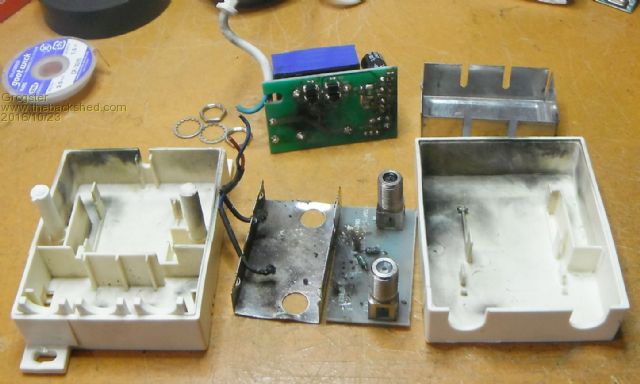 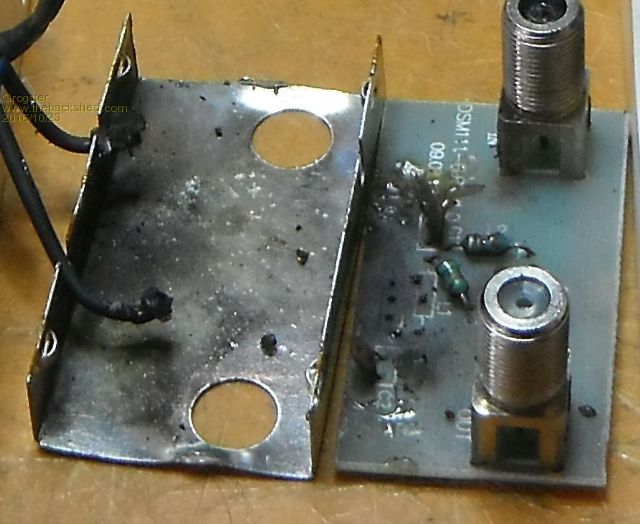 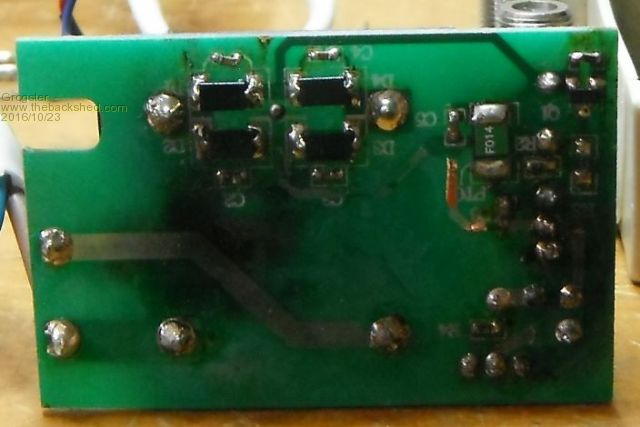 That used to be a TV distribution amplifier, and this was out in the field, not even in the main complex that was hit, so the lightning has come screaming down the underground cable-TV feeds too, and did that to this amp in a completely separate building from the main one. Wow.  I expect I will be finding new faults and replacing parts up to Christmas and probably beyond at this rate. Smoke makes things work. When the smoke gets out, it stops! |
||||
TassyJim Guru Joined: 07/08/2011 Location: AustraliaPosts: 6450 |
At least you can see where the faults are. When you are left with the intermittent faults in a few months time, you will be wondering if you can still blame the lightning. Jim VK7JH MMedit |
||||
| Paul_L Guru Joined: 03/03/2016 Location: United StatesPosts: 769 |
I wonder if there are any dogs around your neck of the woods who might be able to sniff out things that have been smoked. I used to have a Saint Bernard who seemed to be intrigued by things that had caught fire. She would pick up partially burned wood from a fireplace and bring them to me. I never could figure out what she wanted me to do with them. A time domain reflectometer might prove to be very useful in finding impedance changes in buried coax. We had a dandy one made by Tektronix at Pan Am. It worked great for finding crushed coax buried in an aircraft. Here's a cheap one ($99.99) in Jacksonville, FL. http://www.pcliquidations.com/p1567-canoga-perkins-1401-tdr?utm_source=google&utm_medium=cse&utm_term=1567&r160164167166 161&gclid=CL7uutfc8M8CFZdbhgodmXQMjw Or you might try to cobble one together with a signal generator and a scope like this. http://www.allaboutcircuits.com/projects/build-your-own-time-domain-reflectometer/ Paul |
||||
| cwilt Senior Member Joined: 20/03/2012 Location: United StatesPosts: 147 |
Lightning rods may only prevent a direct strike. Damage can still be done. I have seen it happen even with the most extensive lighting protection systems on refineries. My father used to disconnect the coax from his ham radio gear and stick the end in a glass mason jar when a storm approached. The 140 foot tower with multiple antennas attached to the house would build up a lot of static. The mason jar would glow with static discharge arcs. The tower had no ground straps and took several strikes but the house was never hit. I enjoy a good lightning storm and often photograph the bigger storms. |
||||
Grogster Admin Group Joined: 31/12/2012 Location: New ZealandPosts: 9870 |
Do members still want me to post photos of the carnage here, or have you seen enough? Smoke makes things work. When the smoke gets out, it stops! |
||||
| Paul_L Guru Joined: 03/03/2016 Location: United StatesPosts: 769 |
Photos showing how not to solder are always good for a laugh. Paul in NY |
||||
| Phil23 Guru Joined: 27/03/2016 Location: AustraliaPosts: 1667 |
Keep going! We love em! But would still like to know if anyone felt the magnetic shock. Were you personally close to the strike when it hit? In the building I mean. Phil. |
||||
| greybeard Senior Member Joined: 04/01/2010 Location: AustraliaPosts: 178 |
i luv the smell of smoke in the morning..... pics and story please |
||||
Grogster Admin Group Joined: 31/12/2012 Location: New ZealandPosts: 9870 |
Hi folks. @ Phil: I was about thirty meters away from the main strike, and outside at the time, but under a car canopy outside a reception. Receptionist inside insists she saw a big blue lightning bolt shoot over the top of my head, but still under the canopy. I do not recall seeing that, and certainly did not feel any kind of contact with the discharge at all, so I am not sure if she was imagining that or not. I said it was probably my electric personality.  The main strike about thirty meters away was GIGANTIC - the biggest lightning strike I have ever seen in my life thus far. .....and it was EXTREMELY loud. Lots of people thought it was a bomb. It shook most of buildings in the area, and made windows rattle etc - it was a huge discharge. Some more carnage photos for you then: End blown off RG11 cable-TV feed cable - this was one block of buildings over from where the main strike was.  An outlet in one of the rooms: 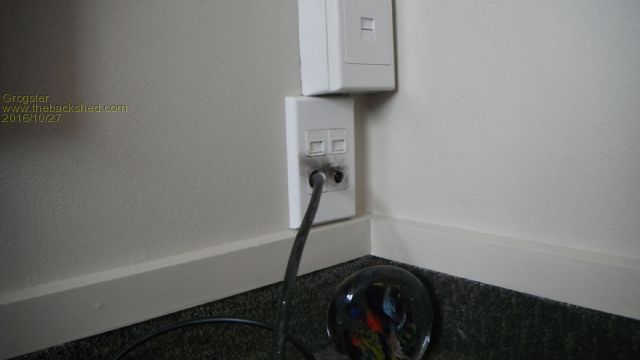 Another TV distribution box out in the field: 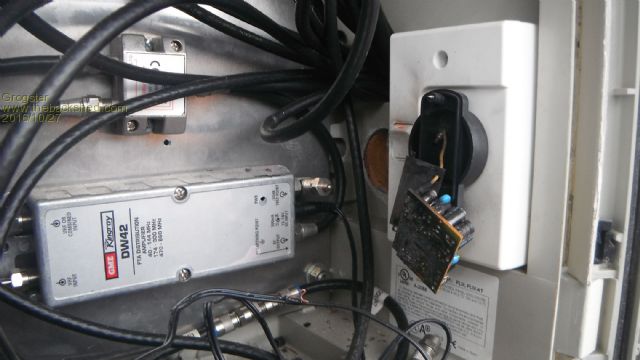 Another shot of the amp PSU carnage: 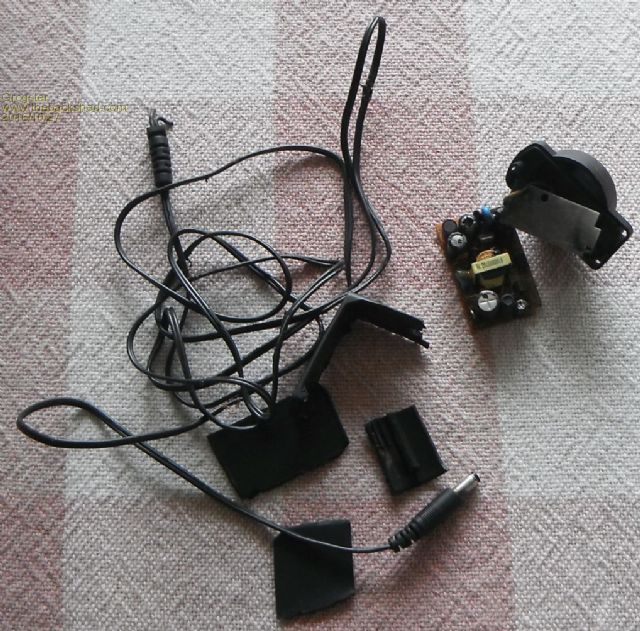 Nursecall system mainboard: 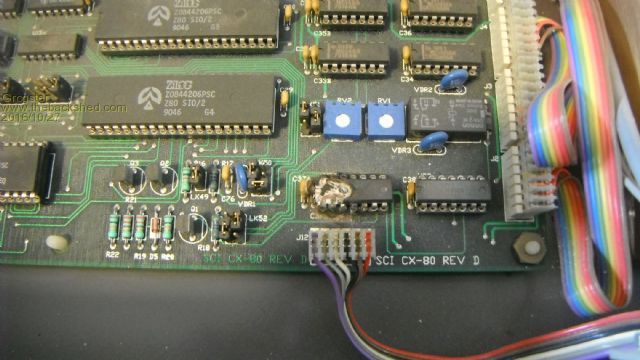 If these photos are of any interest to people, I will keep posting them as I discover damage, but I guess after a few photos, they all start to look the same eh? Smoke makes things work. When the smoke gets out, it stops! |
||||
MicroBlocks Guru Joined: 12/05/2012 Location: ThailandPosts: 2209 |
I am curious what kind of board is on the last picture. Are those Z80 SIO chips? Microblocks. Build with logic. |
||||
TassyJim Guru Joined: 07/08/2011 Location: AustraliaPosts: 6450 |
@Phil When your that close, there is a loud bang or crack, much like a fire cracker but much bigger. There is a smell of Ozone in the air. No rumbling or echos, just the one very, very loud crack. As far as damaged equipment, anything that is connected to something else through any sort of cabling is the first to go. Jim VK7JH MMedit |
||||
| Phil23 Guru Joined: 27/03/2016 Location: AustraliaPosts: 1667 |
Yeah, About 50 metres is as close as I've been to a strike. Was talking to the next door neighbour at the time, him cleaning his gutter on a ladder. Reckons he felt a tingle at the time, but the reaction I saw could have just been a scare. I didn't feel a thing, but F#$% bright & loud, & the ozone smell was pretty strong. Solar Sensor on the weather stat now Jim; could not handle having empty sockets on the PCB..... Phil. |
||||
| The Back Shed's forum code is written, and hosted, in Australia. | © JAQ Software 2026 |